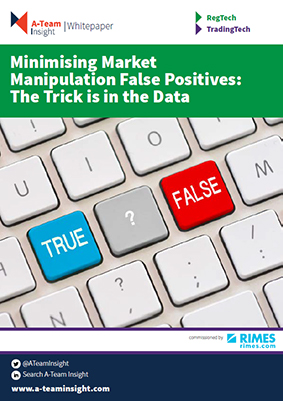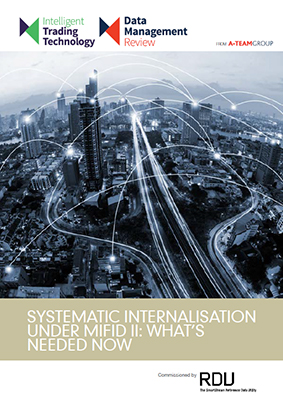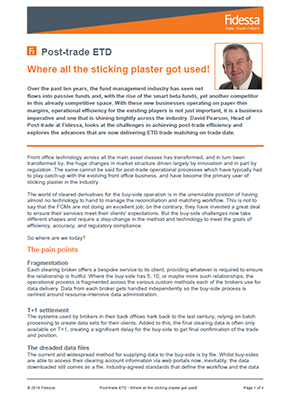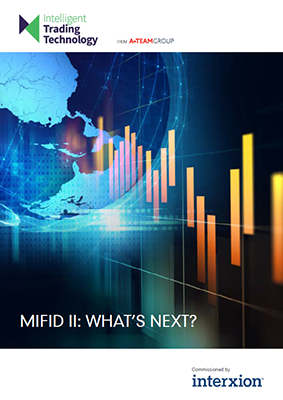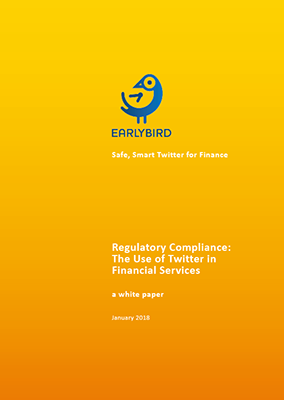RegTech Insight White Paper
Getting eComms Surveillance Right
Demand for electronic communications (eComms) surveillance has risen in response to regulatory requirements and compliance needs to pinpoint problems such as market abuse without wasting time and resources reviewing false positives. Innovative technologies such as machine learning, natural language understanding (NLU) and other strands of artificial intelligence (AI) are improving financial services firms’ ability to...
Quantity vs. Quality: An Evolving Research Paradigm
A revolution is under way in how buy-side firms conceptualize value in the research they consume. However, sell-side houses may be behind the curve in recognizing this. Driving this change in perception among buy-side firms is the EU’s Markets in Financial Instruments Directive II (MiFID II). Under MiFID II, buy-side firms have to pay for...
Minimising Market Manipulation False Positives: The Trick is in the Data
The focus on market manipulation has probably never been higher. In the wake of the Financial Crisis of 2008, with its multiple market manipulation scandals, regulators have ratcheted up compliance requirements for firms. The media has also sharpened its focus – the cost of a controls failure in this area can be catastrophic in terms...
Applying Emerging Technologies to Real-World Business Challenge in Financial Services
Today’s world of technology is evolving at lightning speed for financial services firms. Terms like artificial intelligence (AI), machine learning (ML) and distributed ledger technology (DLT) bandied about, technology conversations seem to be all about hype. The reality is that financial services firms need to understand the impact that these new technologies could have and...
MiFID II: Navigating the Emerging Liquidity Landscape
The September 1 deadline for full implementation of the Systematic Internalisation (SI) regime marked the beginning of a whole new liquidity landscape, with firms on both sides of the equation grappling to understand the long-term implications of the new system on Europe’s financial markets. Navigating these waters in the coming months will be challenging for...
Systematic Internalisation Under MiFID II: What’s Needed Now
From September 1, 2018, firms within the scope of MiFID II that breach volume thresholds set by ESMA on August 1, 2018 for internal matching of client orders will be required to register as systematic internalisers (SIs) and operate within the SI regime detailed in the regulation. Sounds pretty straightforward, but that is far from...
Post-trade ETD – where all the sticking plaster got used!
The fund management industry’s shift to passive funds and embrace of smart-beta funds over the past decade or so has shaved margins to the extreme. In this environment, operational efficiency becomes an existential issue. Across a broad swathe of asset classes, front-office technologies have kept pace with massive changes in market structure driven by regulation...
MiFID II: What’s Next?
With regulators indicating that they will enforce MiFID II in the second half of this year, how robust is your compliance solution? How ready is it to take on the oncoming requirements of the regulation? And to what extent do you need to review and renew systems to achieve a sustainable, industrialised and cost-efficient solution?...
MiFID II: Industrialising the Response Using UL BRIDGE
Many firms within the scope of Markets in Financial Instruments Directive II (MiFID II) struggled to meet the regulation’s deadline of January 3, 2018 and are now waking up to the fact that many of the processes put in place for implementation day are not sustainable. To achieve and maintain MiFID II compliance over time...
Regulatory Compliance: The Use of Twitter in Financial Services
Twitter has emerged as a source of market-moving information. But it’s difficult to get Twitter delivered to your trading desk, for a variety of reasons, ranging from concerns about market abuse, to the proliferation of fake news and the potential risk of reputational damage. By banning Twitter, trading firm management may be seeking to avoid...




